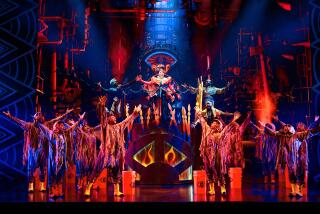STAGE REVIEW : A ROCKY REPRISE OF A ROCK OPERA
- Share via
In 1969 the rock opera “Tommy” was a phenomenon. In 1987 it is a period curiosity. Much of its original power lay in its novelty as an art form, but much of its appeal today relies on nostalgia, as can be seen in the current production at Saddleback College. The rock still rolls, but the opera limps.
“Tommy” has a place in rock history as the ground-breaking effort by the British rock band the Who to produce an album that told a story through the musical idiom of the day. The original album enjoyed wide popularity (and spawned the hit single “Pinball Wizard”) with its story of a traumatized deaf, dumb and blind boy who achieves notoriety as a pinball champ and then breaks through his psychosis to develop a cult following and becomes a tyrannical guru.
“Tommy” has seen other incarnations--as a 1972 recording with the London Symphony Orchestra and as a 1975 film directed by Ken Russell.
But as a stage piece, “Tommy” immediately runs into some problems. Director Patrick Fennell pays allegiance to the spirit of the original recording, but the sketchy plot makes incomprehensible shorthand out of several story points. A lot of ground is covered in 90 minutes: murder, passion, mental illness, drugs, cruelty, child abuse, phony miracle cures, redemption, cults, hero worship, hubris and despair.
The libretto--adapted here by Fennell and Cyrus Parker--gives short shrift to the return of Tommy’s father, believed missing in action during World War II, as well as to the subsequent murder of his mother’s lover and the traumatizing of the boy, who witnessed the deed. Tommy’s fatal arrogance as he starts believing his own PR and, later, the faster-than-a-speeding-bullet rebellion of Tommy’s new-found followers are a bit, well, baffling.
Fennell supplies a detailed synopsis of the story in the program and in texts and visuals projected on two upstage screens. That an English-language opera would require supertitles is a clue to the problems here.
There are other troubles. The high-level amplification of both the musical accompaniment and the soloists (who use hand-held mikes) too often drowns out or distorts the lyrics.
The staging is imaginative, bold and busy, matched by Wally Huntoon’s eye-popping set depicting a giant pinball machine. But occasionally, as in “Fiddle About,” the staging overwhelms the story and gimmick gets in the way of the message. Most distracting is the use of blackouts between numbers, which has the effect of bringing the flow of ideas to a halt.
The music, however, is still vibrant ‘60s rock ‘n’ roll, and it is given its due at Saddleback by a group of inspired musicians: Mike Bushong, Tom Haines, Christopher J. Landen, Mike Robbins and Peter Dunkley. Fennell has also recruited strong voices for his leads, starting with Keith D. Henderson as Tommy. Henderson makes an exuberant Tommy, effectively taking him from a boy wrapped in his own world to a charismatic leader of lost souls. His agility provides a needed measure of spontaneity as he roves all over the stage, celebrating the music and urging the audience to feel the heat, too.
More fine vocals are contributed by Shane Donavan and Beth Hansen as Tommy’s parents; Chris Churn as nasty Cousin Kevin, Marla Fennell as the world-weary Acid Queen and Doris (Shara) Rhodes as the nurse.
Choreographer Cyrus Parker has compiled a curious combination of square dance, jigs, jazz, gymnastics, cha-cha and frug, but the execution is uneven. Costume designer Charles Castagno has worked to create the look of the late ‘60s, dredging up bell bottoms, miniskirts, paisley shirts and Nehru jackets. This version also borrows visually from former incarnations of the rock opera, including the Elton John-flavored get-up for “Pinball Wizard.”
“Tommy” will run Thursday through Sunday in McKinney Theatre at Saddleback College, 28000 Marguerite Parkway, Mission Viejo. Information: (714) 582-4656.
More to Read
The biggest entertainment stories
Get our big stories about Hollywood, film, television, music, arts, culture and more right in your inbox as soon as they publish.
You may occasionally receive promotional content from the Los Angeles Times.










